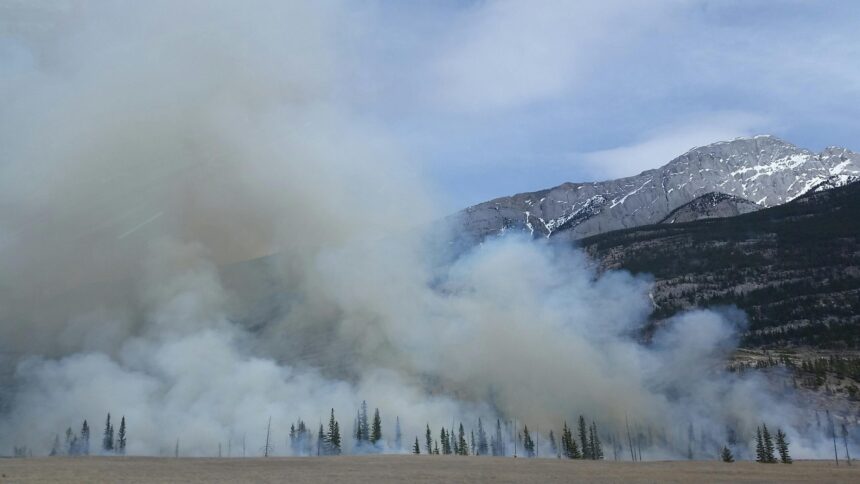A powerful heatwave sweeping across southern Europe has ignited dozens of wildfires, forcing thousands of residents and tourists to flee their homes as temperatures soar above 40°C (104°F). Red heat alerts have been issued across parts of Italy, France, Spain, Portugal, and the Balkans, with health authorities warning of extreme risks due to the oppressive heat.
In Spain, the national weather agency Aemet warned that temperatures could reach as high as 44°C (111.2°F) in the southern cities of Seville and Cordoba. Portuguese officials echoed similar warnings, with forecasts predicting 44°C highs in the south of the country.
Tragic incidents have already occurred. In Italy, a child succumbed to heatstroke on Monday, while in Tres Cantos, north of Madrid, a man died in hospital after sustaining severe burns. Hundreds of people in Tres Cantos were evacuated due to rapidly spreading fires, which regional authorities described as having “explosive characteristics” caused by a dry thunderstorm and winds exceeding 70km/h (43.5mph).
Spanish Prime Minister Pedro Sánchez took to X on Tuesday, praising emergency workers for their tireless efforts to control the fires. “We are at extreme risk of forest fires. Please be very cautious,” he urged the public.
In Spain’s northwestern region of Castile and Leon, nearly 4,000 people have been evacuated as over 30 active wildfires rage — one of which is threatening Las Médulas, a UNESCO World Heritage site famed for its ancient Roman gold mines. In the southern Andalusian region, another 2,000 people were evacuated from hotels and homes around Tarifa, a popular tourist destination.
Spain’s national military emergency unit reported on Tuesday morning that nearly 1,000 soldiers had been deployed across the country to assist in firefighting efforts.
In neighbouring Portugal, firefighters are contending with three major wildfires. The most critical of these, near Trancoso in the centre of the country, was brought under control on Tuesday. Over 1,300 firefighters and 14 aircraft were deployed, with Morocco stepping in to send two planes after Portuguese water bombers broke down, according to Reuters. Authorities warned that temperatures in the south could hit 44°C, and nighttime lows would not drop below 25°C.
Italy is also reeling under intense heat, with red alerts in place for 16 cities, including Rome, Milan, and Florence. A four-year-old Romanian boy was found unconscious in a car in Sardinia and later airlifted to a hospital in Rome. He died from irreversible brain damage caused by heatstroke, according to medical officials who spoke to AFP.
France is experiencing widespread impacts, with nearly three-quarters of the country under heat alerts as of Tuesday. Temperatures were forecast to climb above 36°C in the Paris area and reach 40°C in the Rhône Valley. French Health Minister Catherine Vautrin said hospitals were preparing for a surge in heat-related cases during what is already the country’s second heatwave in a matter of weeks. On Monday alone, 80 weather stations across France broke August records, with 58 setting new all-time temperature highs.
In Greece, strong winds intensified fires on the islands of Zakynthos and Cephalonia, leading to evacuations from villages and hotels. Another major fire near the western town of Vonitsa posed threats to homes, while evacuations were also ordered in four regions on the mainland.
A major blaze in Turkey’s northwestern Canakkale province displaced hundreds of residents. Governor Omer Toraman stated on X that firefighting efforts included seven planes and six helicopters. He also confirmed the closure of the Dardanelles Strait — a key maritime link between the Aegean Sea and the Sea of Marmara — to ensure safe operations for aerial firefighting teams.
Albania also saw evacuations on Monday due to advancing wildfires, while a significant blaze in Split, Croatia, was contained by Tuesday. In Montenegro, a devastating fire swept through the village of Piperi near the capital, Podgorica, destroying several homes.
Meanwhile, the UK is enduring its fourth heatwave of the year, with amber and yellow heat health alerts issued across all of England. Forecasters predict temperatures could peak at 34°C in some areas.
Scientists continue to warn that climate change is intensifying heatwaves across the Mediterranean region, leading to hotter, drier summers and prolonging fire seasons. These extreme conditions are making wildfires more frequent, destructive, and difficult to control.






